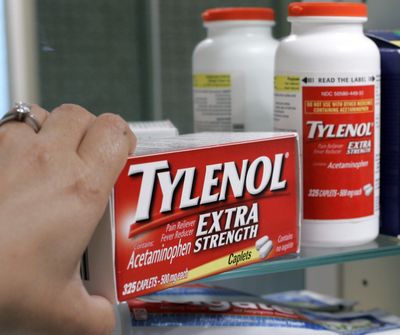Johnson & Johnson adding new warning about Tylenol
Risk of acetaminophen overdose prompts advisory on bottle caps

WASHINGTON – Bottles of Tylenol sold in the U.S. will soon bear red warnings alerting users to the potentially fatal risks of taking too much of the popular pain reliever. The unusual step, disclosed by the company that makes Tylenol, comes amid a growing number of lawsuits and pressure from the federal government that could have widespread ramifications for a medicine taken by millions of people every day.
Johnson & Johnson says the warning will appear on the cap of new bottles of Extra Strength Tylenol sold in the U.S. starting in October and on most other Tylenol bottles in coming months. The warning will make it explicitly clear that the over-the-counter drug contains acetaminophen, a pain-relieving ingredient that’s the nation’s leading cause of sudden liver failure.
“We’re always looking for ways to better communicate information to patients and consumers,” says Dr. Edwin Kuffner, vice president of McNeil Consumer Healthcare, the Johnson & Johnson unit that makes Tylenol.
Overdoses from acetaminophen send 55,000 to 80,000 people to the emergency room in the U.S. each year and kill at least 500, according the Centers for Disease Control and Prevention and the Food and Drug Administration. Acetaminophen can be found in more than 600 common over-the-counter and prescription products used by nearly one in four American adults every week, including household brands like Nyquil cold formula, Excedrin pain tablets and Sudafed sinus pills.
Tylenol is the first of these products to include such a warning label on the bottle cap. McNeil says the warning is a result of research into the misuse of Tylenol by consumers. The new cap message will read: “CONTAINS ACETAMINOPHEN” and “ALWAYS READ THE LABEL.”
The move comes at a critical time for the company, which faces more than 85 personal injury lawsuits in federal court that blame Tylenol for liver injuries and deaths. At the same time, the Food and Drug Administration is drafting long-awaited safety proposals that could curtail the use of Tylenol and other acetaminophen products.
Much is at stake for McNeil and its parent company. Johnson & Johnson does not report sales of Tylenol, but total sales of all over-the-counter medicines containing acetaminophen were more than $1.75 billion last year, according to Information Resources Inc., a retail data service.
Safety experts are most concerned about “extra-strength” versions of Tylenol and other pain relievers with acetaminophen found in drugstores. A typical two-pill dose of Extra Strength Tylenol contains 1,000 milligrams of acetaminophen, compared with 650 milligrams for regular strength. Extra Strength Tylenol is so popular that some pharmacies don’t even stock regular strength.
Most experts agree that acetaminophen is safe when used as directed, which generally means taking 4,000 milligrams, or eight pills of Extra Strength Tylenol or less, a day.
Each year, some 100 million Americans use acetaminophen, but liver damage occurs in only a fraction of 1 percent of users. Still, liver specialists say those cases are preventable. They say that part of the problem is that there are sometimes hundreds of pills in a bottle, making it easy for consumers to pop as many as they please. For example, McNeil sells Extra Strength Tylenol in bottles containing up to 325 tablets
“The argument goes that if you take acetaminophen correctly you will virtually never get into trouble,” said Dr. William Lee of the University of Texas Southwestern Medical Center, who has studied acetaminophen toxicity for four decades. “But it’s the very fact that it’s easily accessible over-the-counter in bottles of 300 pills or more that puts people in harm’s way.”
Lee applauded the new warning but said McNeil’s marketing has contributed to the “freewheeling” way that Americans take the drug. For decades, McNeil has advertised Tylenol as “the safest kind of pain reliever” when used as directed. “That has been their standard ploy in the past, and I would argue that safest it is not,” he said.
McNeil’s Kuffner stands by the company’s safety claim: “When taken as directed, when people read and follow the label, I believe that Tylenol and the acetaminophen ingredient is one of the safest pain relievers on the market.”
McNeil is the only major drugmaker adopting the bottle cap warning at this time, according to the Consumer Healthcare Products Association, a trade group for over-the-counter medicine companies.